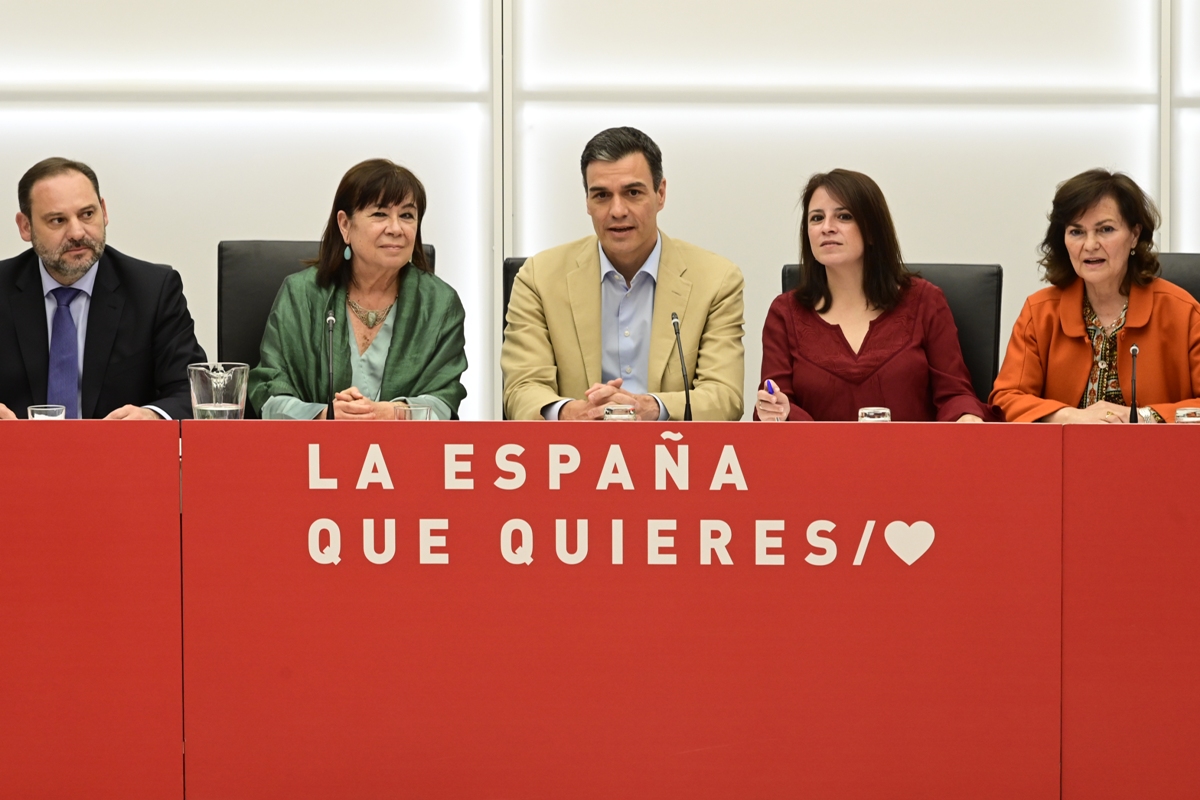India’s top 500 pvt cos value more than total GDP: Report
These companies value higher than the GDP of India and the combined GDPs of UAE, Indonesia, and Spain.
The resurgence of the far-right in Spain, as in Germany, would have been greeted with a degree of modified satisfaction by General Franco.

Spanish Prime Minister Pedro Sanchez (C) sits between (L-R) Socialist Party (PSOE) organisational secretary Jose Luis Abalos, party president Cristina Narbona, party vice secretary general Adriana Lastra and Deputy Prime Minister and Equality Minister Carmen Calvo during a PSOE meeting in Madrid on April 29, 2019 a day after winning general elections. (Photo by JAVIER SORIANO / AFP)
History has not repeated itself, after all. The resurgence of the far-right in Spain, as in Germany, would have been greeted with a degree of modified satisfaction by General Franco.
The ascendant segment in parts of Europe has been pipped to the post by the socialists. For all its robust nationalism of the right, the third general election has given the Spanish Socialist Party (PSOE) a renewed mandate to govern one of Europe’s most fragmented nations, not the least owing to the sub-regional jingoism in Catalonia.
Advertisement
Pre-poll projections about last Sunday’s election have gone awry. It thus comes about that contrary to predictions, there was no populist movement, whether from the right, the left or the regions. Instead, the clear winner in a complex multi-party and regionally diverse contest that is characteristic of modern Spain is one of the two parties which have dominated the narrative since the return to democracy in the 1970s, pre-eminently the centre-left PSOE socialists of Pedro Sánchez.
Advertisement
He has now been approved by the Spaniards for yet another innings at the crease, signifying, at any rate for now, the retreat of the farright and its praxis of nationalism. The socialist victory was fairly clear-cut, though not absolute and will, therefore, be keenly watched around Europe.
It is pretty obvious that in a swathe of the continent, the social democratic centre-left still retains its inherent strength to win elections by offering socially inclusive improvements to the status quo. The success of the socialists can in large part be attributed to the eclipse of Spain’s other traditional party ~ the centre-right People’s Party (PP).
The psephological swing has been astonishing. Having won 45 per cent of the vote in the 2011 election, its share dwindled to 17 per cent last Sunday. In 2018 the Gürtel corruption case did the PP government in and first brought Sánchez to power. The vacuum or the space vacated by the PP on the right has now been seized by the ultra-nationalist and conservative Vox party, which has won 10 per cent of the votes.
If the Vox leader, Santiago Abascal’s statement is any indication, it has spoken in terms of a “reconquest” ~ an expression with an anti-Muslim and anti-semitic connotation. For all that, it would be premature to view the performance of Vox as a decisive swing towards the far right in Spain, still less a revival of Francoism.
In the aftermath of the election, Spain has been described as staunchly Catholic, socially conservative, and Castilian centralist.
Last Sunday witnessed a redistribution of the right-wing vote between the PP and Vox – not an increase in it. The resurgence of the right has, therefore, been mild in Spain as in Europe generally. With socialists at the helm, the time for polarization is not yet, though the headache over Catalan separatism shall persist for a while.
As he savours the triumph, this is arguably the uppermost thought of Pedro Sanchez . As the last of the social democrats, Jyoti Basu would have enjoyed a quiet chuckle over the socialist victory.
Advertisement